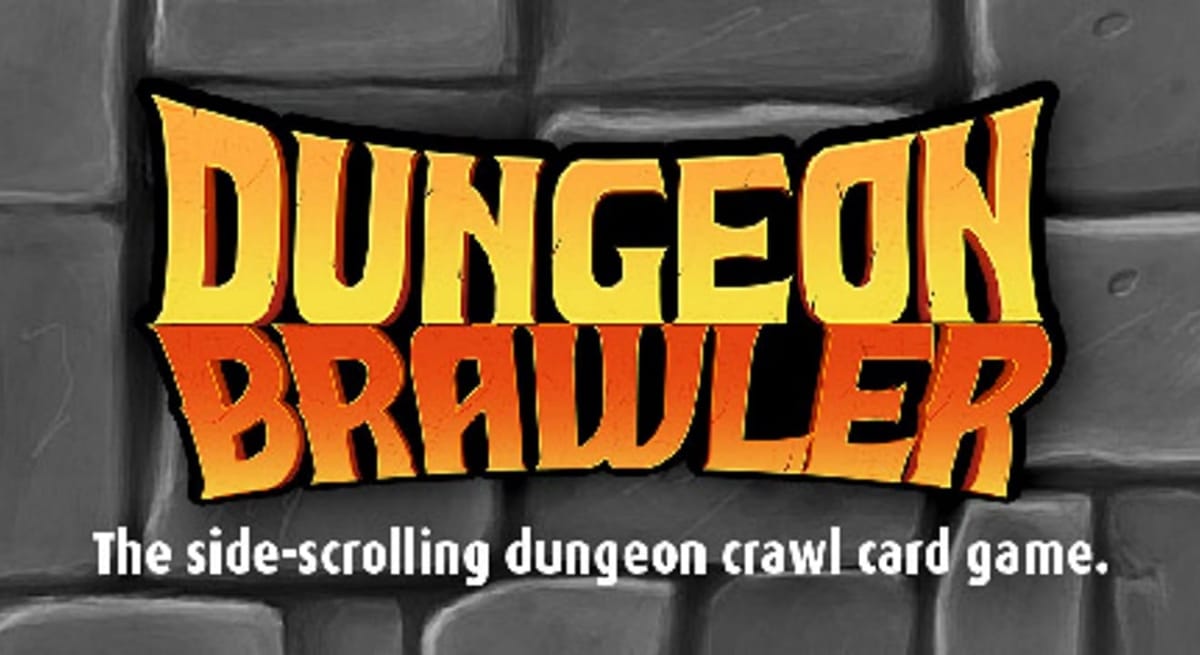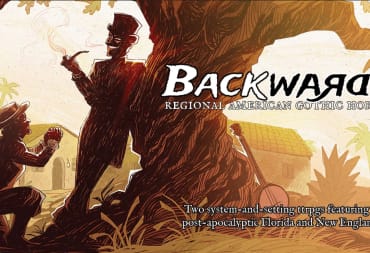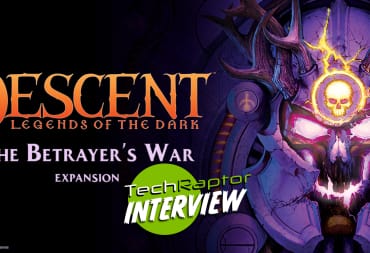This spring, Techraptor interviewed Joey Turco, event host for the Gamerati Meetup Group. We discussed how crowdfunding affects game design as well as his team’s upcoming Dungeon Brawler tabletop game. Dungeon Brawler is a joint venture between Gamerati and Hypercube Games. It seeks to capture the feel of classic beat-em-ups such as Streets of Rage and Final Fight as a cooperative card game. With a playtime of about 30 minutes and support for 1-4 players, Gamerati and Hypercube Games designed it for easy, quick play.
If you are interested in supporting Dungeon Brawler, you can do so via this Kickstarter page. At time of writing, it has already met its $5,000 initial goal. You can continue to back their Kickstarter until June 27, 2019. Featuring art from Ryan Long, it promises to be easy to pick up and play. Players control one of four heroes, their attributes determining their playstyle. Resolve fights by playing combinations of cards, but take care, your hand doubles as your lifebar.
Dungeon Brawler offers worldwide shipping. Backers will not be charged additional shipping & handling costs after their initial purchase.
TechRaptor: For people unfamiliar with the game, how would you describe Dungeon Brawler?
Turco: Dungeon Brawler is a compact easy to learn, dungeon crawl that mimics the old school feel of a sidescroller. You get loot and fight more and more monsters until you reach and defeat the boss. The game is made of two decks of cards and other hero cards so it's a fast, lightweight, tactical game with deck building elements
TechRaptor: How has Dungeon Brawler changed throughout its development?
Turco: Like most games, DB went through many changes, but I received the game when it largely looked like it does today. When Ed (Healy) and I started playing around with it, and while we liked it and knew the game was going to be good, it wasn't quite there. Originally you only ever recycled your discard into your deck when purchasing loot from the loot row. The cards you used to "buy" would become your new deck and the loot would go into your hand. However, we had found that to be super confusing. There were times when you'd run your deck down, and be unable or unwilling to purchase anything in the loot row. If that was the case, when it's your turn to draw cards, you'd have to draw one at random from your discard. This was so anti-deck-builder rules that it was just overly confusing. Another thing we added which I later found out was originally planned, were player actions. When we were playing the game we found that we could always do something but it often times felt like we were all the same person, so the player actions reinforce the theme and individuality of the characters.
TechRaptor: How do you prefer to approach game design? (Balance, tweaking mechanics, artistic direction, etc.)
Turco: Generally, my approach starts with a theme and a mechanic. If you have an idea for a cool mechanic, then you should start thinking about what that'll mean on a board. For instance, If your mechanic basically boils down to making circuits, you can make it anything from sci-fi to trains, but the theme still needs to fit. Once you've built out its core, you can add a few more things that fit further to the theme. Then when you've got a very basic idea, play it, show it, play it again. Play it until you hate it, and play it one more time. Then I take a step back and I ask people and myself where the fun is. Where exactly is the fun in a game? Just because a game is a game doesn't mean it's inherently fun. Plenty of decently produced games are just not that fun for a myriad of reasons. Once I've found the fun - the tweaking begins to make it a balanced and interesting game. After that most everything else boils down to simple choices like what art do I like, or how big should it be?
TechRaptor: Who/What are some of your major influences? How have they shaped your own approach?
Turco: I've always been very interested in the gritty mechanics of a system. This was largely due to two specific games in my life.
The A-MAZE-ing Labyrinth was a game I played when I when I was only six and it was a favorite for me because it wasn't a roll-and-go. Up until that point, I had been introduced to Monopoly, Candy Land, Life and Sorry. All of those had tremendous amounts of luck involved, and here was a game that, while it DID have luck elements, it had so many choices to make when it was my turn. And figuring out the puzzle was super satisfying. This was my first game that showed player agency, and ultimately lead to my love of worker placement games, because of their high player agency.
Clue was also very big for me, and was one of the first board games I made a house rule for - we made it so that if you rolled a 1-3 you could move to an adjacent room, but on a 4-6 you could move two rooms - this eliminated the need for high rolls so you could get anything done. This game was one of the first social games I had ever played, and the deduction and problem solving were amazing. I remember several times, my friends or family would ask for something like the Ballroom, with Plum, and the Candlestick. They would ask these three of a player hoping to be shown ANYTHING. Meanwhile, I'm holding Plum and the Candlestick. So when they're shown a card I knew what card they must have shown. So one player writes something down, and so do I, we had to restart the game just so I could prove that I wasn't peeking at cards. This game really helped me love the interaction aspect of social and deduction games and really cemented my eventual love for co-ops because of the high amounts of deduction and communication that was necessary.
After those games, I eventually found Catan, Lords of Waterdeep, BANG! and many others that up and blew my mind as to what a game COULD be.
TechRaptor: Do you have a dream project? What would it be?
Turco: Yes. No. Kinda? I'm not 100% sure what it would be, but I know I would like to really create something that could have multiple games within the same world. So whether I'm working on my own dungeon crawl game (which I am at the moment), or any other type of game, I would like them to have a continuous theme, kind of like the North Sea series from Garfil Games, or the Valeria series from Daily Magic Games.
TechRaptor: What was one of your biggest challenges to overcome?
Turco: For Dungeon Brawler, the biggest challenge was actually the number tweaking. There's a significant luck-factor in this game, and when the numbers were all over the place on the first contact, we destroyed the dungeon regularly, we had to pump some monsters up, add more, and turn down some of the more powerful items. I still get to thinking that certain things are overpowered, but I have to remember that sometimes you get lucky loot and sometimes you get your face melted by a flame elemental. Finding the fun was actually the easiest part.
TechRaptor: What would you say is your biggest accomplishment to date?
Turco: Well, if DB takes off, it'll be having my name credited on a game :)
TechRaptor: What keeps you motivated on difficult days?
Turco: Sheer determination! If by sheer determination you mean Rockstar energy drinks and burritos.
TechRaptor: How do Kickstarter campaigns impact design or other work?
Turco: The KS can really put things in perspective for just how much money gets sunk in other things like shipping. For instance, if your game is heavy, for whatever reason, you will need to consider the box design and make sure it fits in a USPS flat-rate box. a 5 lb game that can't fit might be $20 but one that can is only $15 - so redesigning things like the overall size of the game becomes a major deal when faced with shipping thousands of copies and potentially overpaying for shipping by $5 a pop. And without KS we'd not really have to think about that. Traditional channels would have you moving cases to distribution, not thousands of packages directly to customers.
KS can also alter the design of a few things when you begin to get perspective on your own game and realize that maybe your game is worth $80, but if you've crammed a lot of stuff in there. If the backers aren't sure about your game, maybe it's time to pull back and re-tool and see if you can shave some stuff off for a better price point.
As previously mentioned, if you are interested in backing Dungeon Brawler, you can do so here Its stretch goals include a new “portal” dungeon card and five new pet loot cards. You can support the Kickstarter up until Thursday, June 27.
What do you think of this interview? Are you itching to share your thoughts on Dungeon Brawler? Please let us know in the comments.
Have a tip, or want to point out something we missed? Leave a Comment or e-mail us at tips@techraptor.net












